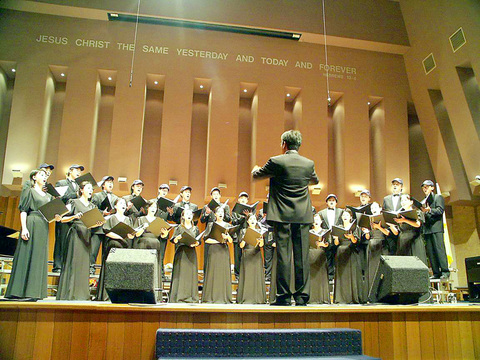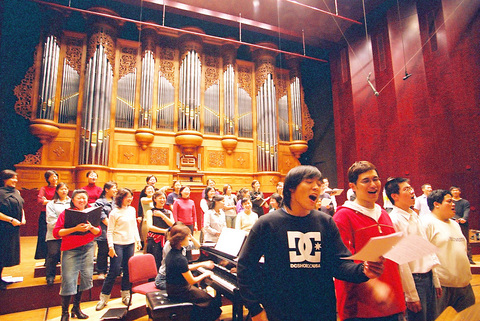The plum rains have come and gone and June's warmth has coaxed the last stubborn buds into full bloom. This weekend the Formosa Singers (
The Formosa Singers, a mixed choir of about 40 members, was remodeled from the Taipei Philharmonic Madrigal Choir in 1995 by conductor Julian Su (
Su, one of Taiwan's top choral conductors, has over 20 years of conducting experience under his belt. After graduating from the Cultural University in 1981 with a major in cello performance, Su's interest soon shifted to choral music. During the years from 1984 to 1991 he took turns conducting the Tamkang Chorus, Hwakang Chorus, the Taipei Philharmonic Chorus, and a group of his own, the Taipei Philharmonic Madrigal Choir (1985).

PHOTO COURTESY OF FORMOSA SINGERS
In 1992 Su traveled to New Jersey to attend Westminster Choir College at Rider University. There he studied with famous choral conductor Joseph Flummerfelt. During his final recital for his master's degree, Su conducted a choir singing Taiwanese folk songs that he arranged.
For Su, bringing the songs of Taiwan to the stage is not just about work or interest, it's about identity. He sees it as his duty to prevent the songs beloved by his generation from disappearing.
"In the past, this music was suppressed," Su said. "Perhaps in the future it could disappear." Under Martial Law, the Chinese Nationalist Party (KMT) suppressed native Taiwanese culture and language and non-Mandarin folk songs were banned from the airwaves.

Su said that if the Formosa Singers were not promoting Taiwanese folk songs now, "it will be much more difficult to do in the future. We are the right generation to connect the past to the future."
Not everyone recognizes the importance of singing the old songs, Su said. "Many people think this work is stupid because they do not identify with it."
The most fulfilling moments for Su are when the music changes those people's minds.
In recent years Formosa Singers has toured in Japan and has made two trips to the US, where a large portion of their audience was Taiwanese immigrants.
The reaction among second-generation Taiwanese-Americans who attended the concerts was especially rewarding, Su said.
"They originally didn't identify with the songs because the arrangements they had heard were old and weren't done very well. They didn't realize the songs could sound so good, until they heard the Formosa Singers," Su said.
What made the difference was the creative and skillful arranging of the tunes by Su and by the group's accompanist Tsai Yu-shan (
The folk origins of Formosa Singers' music don't immediately pop out to the ear. The old familiar tunes have become pollished choral pieces with rich four-part harmonies and diverse melodies. Much of the group's repertoire, if it were translated into Latin, would sound much like music you would hear at a European-style Easter concert. On a closer listening, the folk elements can be identified, woven subtly into the harmonies. The most delightful thing about listening to Formosa Singers is the seamless blend of distinctly Chinese melodies with the traditional sound of a Western-style choir.
The group has been honored a number of times with nominations for Golden Melody Awards. Their album Stars Over the Sky (
Su's interest extends beyond the songs of Taiwan to include folk songs from around the world as well as well as some fresh, modern composers. This weekend's lineup will begin with three Latin pieces by Eastern European composers Damijan Mocnik, Vytautas Miskinis and Gyorgy Orban. Next is the inspiration for the concert's theme, Three Flower Songs, by US composer Eric Whitacre. Su chose Whitacre because he was impressed by the composer's ability to create a modern yet pleasing sound.
"The choral scene in America has recently become closed off and has been dominated by Northern European composers," Su said, "but Whitacre is creating music that is popular all over the world."
Whitacre is famous for his emotionally intense and electrifying choral compositions. He composed the a cappella set Three Flower Songs during his formative years at the University of Nevada and dedicated it to his teacher David Weller, who introduced Whitacre to choral music.
Most of the other songs on the lineup were chosen for dealing with the theme of flowers, so as to complement the Whitacre set. Some notable inclusions include two Japanese folk songs arranged by choral conductor Ko Matsushita, who flew to Taiwan to guest conduct the Formosa Singers for a concert in May of last year, as well as several Hokkien and Hakka folk songs arranged by Tsai.
In August, the Formosa Singers will be taking a selection from this weekend's concert to compete in the Takarazuka International Chamber Chorus Contest in Japan.
Event information :
What: Formosa Singers -- Flower Songs
Where: National Recital Hall, 21-1 Zhongshan S Rd, Taipei
(
When: Tomorrow and Sunday, 7:30pm
Tickets: NT$300 to NT$800, available through Artsticket at (02) 3393 9888 or
Formosa Singers at (02) 2746 0739

On April 26, The Lancet published a letter from two doctors at Taichung-based China Medical University Hospital (CMUH) warning that “Taiwan’s Health Care System is on the Brink of Collapse.” The authors said that “Years of policy inaction and mismanagement of resources have led to the National Health Insurance system operating under unsustainable conditions.” The pushback was immediate. Errors in the paper were quickly identified and publicized, to discredit the authors (the hospital apologized). CNA reported that CMUH said the letter described Taiwan in 2021 as having 62 nurses per 10,000 people, when the correct number was 78 nurses per 10,000

As Donald Trump’s executive order in March led to the shuttering of Voice of America (VOA) — the global broadcaster whose roots date back to the fight against Nazi propaganda — he quickly attracted support from figures not used to aligning themselves with any US administration. Trump had ordered the US Agency for Global Media, the federal agency that funds VOA and other groups promoting independent journalism overseas, to be “eliminated to the maximum extent consistent with applicable law.” The decision suddenly halted programming in 49 languages to more than 425 million people. In Moscow, Margarita Simonyan, the hardline editor-in-chief of the

Six weeks before I embarked on a research mission in Kyoto, I was sitting alone at a bar counter in Melbourne. Next to me, a woman was bragging loudly to a friend: She, too, was heading to Kyoto, I quickly discerned. Except her trip was in four months. And she’d just pulled an all-nighter booking restaurant reservations. As I snooped on the conversation, I broke out in a sweat, panicking because I’d yet to secure a single table. Then I remembered: Eating well in Japan is absolutely not something to lose sleep over. It’s true that the best-known institutions book up faster

Though the total area of Penghu isn’t that large, exploring all of it — including its numerous outlying islands — could easily take a couple of weeks. The most remote township accessible by road from Magong City (馬公市) is Siyu (西嶼鄉), and this place alone deserves at least two days to fully appreciate. Whether it’s beaches, architecture, museums, snacks, sunrises or sunsets that attract you, Siyu has something for everyone. Though only 5km from Magong by sea, no ferry service currently exists and it must be reached by a long circuitous route around the main island of Penghu, with the